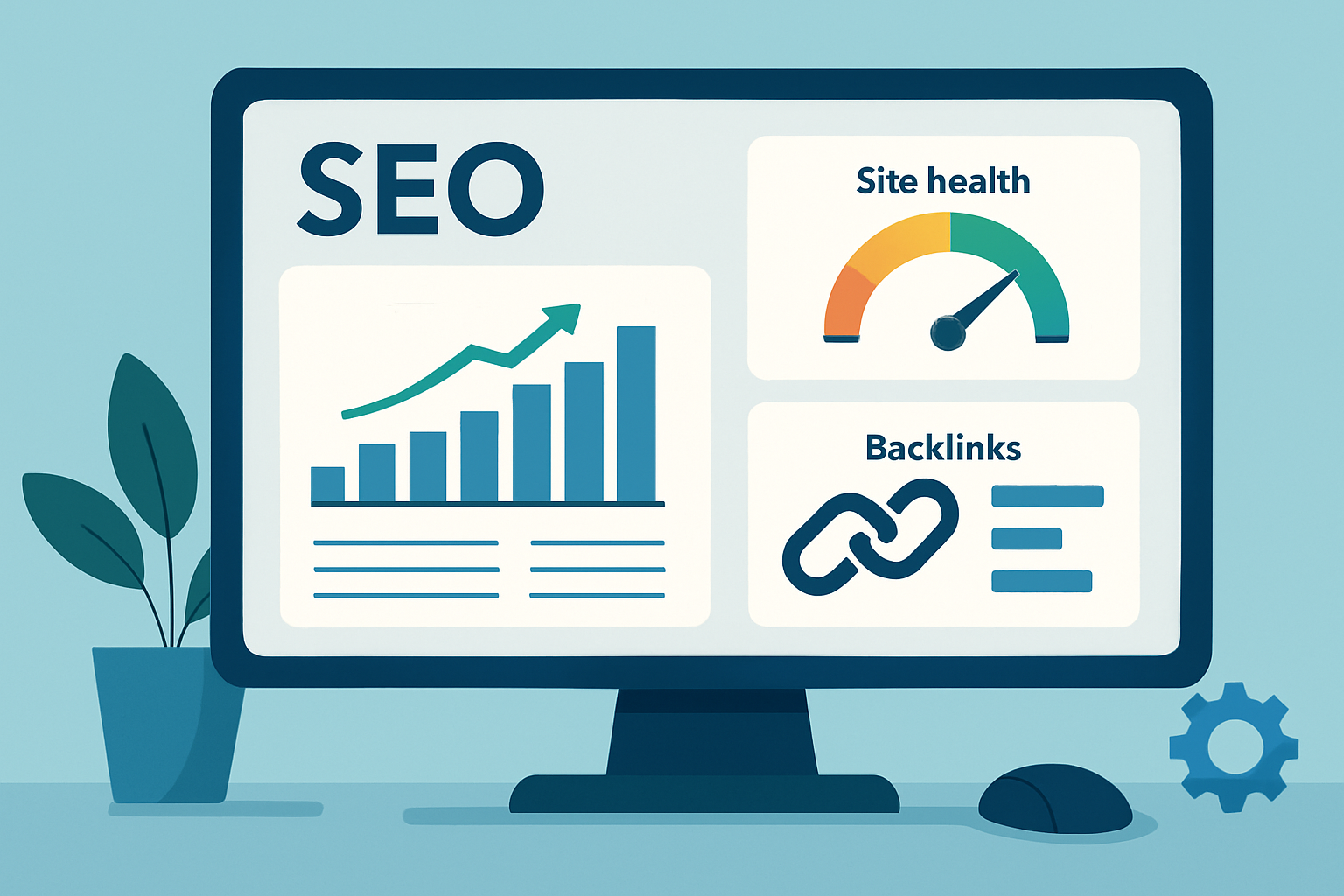Getting Started With Moz for Better Website Analytics

Moz is a solid go-to platform that helps website owners and digital marketers get a grip on their site's SEO health while keeping a close eye on performance metrics. Think of Moz as your full-featured SEO and website analytics sidekick that breaks down the head-scratching world of search engine optimization into manageable bite-sized pieces. This makes it easier to ramp up organic traffic, climb the keyword rankings ladder and give your site’s visibility a much-needed boost. Whether you’re keeping tabs on backlinks, running SEO audits or diving deep into keyword research, Moz serves up practical insights that help you optimize your online presence with confidence.
This guide is designed to help beginners get familiar with Moz’s main features. It walks you through setting up your account and shows practical ways to use Moz in your website analytics.
What Moz Is and Why It Actually Matters for Website Analytics
Moz has been around since 2004 quietly building a solid reputation with its SEO and website analytics tools. It takes a user-friendly and data-focused approach that helps you see the full picture of your site's health—no fluff, just the essentials. Unlike run-of-the-mill analytics platforms, Moz zeroes in on SEO-specific insights with laser focus. It offers unique metrics and features that dive deep into organic search, backlinks and keyword performance.
- Moz Pro: A solid all-around platform that’s great for everything from site audits and keyword research to keeping a close eye on your search rankings—kind of like having a personal SEO assistant at your fingertips.
- Moz Local: Tailored to help businesses manage their local listings with ease, giving your visibility in local search results a nice little boost when you need it most.
- MozBar: This handy browser extension is like a quick glance under the hood, delivering instant SEO metrics for any webpage you land on—super useful when you’re in the zone and need info fast.
- Open Site Explorer: A go-to tool for diving deep into backlink profiles and getting a read on domain authority—it’s like your SEO detective for link analysis.
- Keyword Explorer: A powerful tool that helps you unearth and weigh up keyword opportunities, perfect for finding those hidden gems that could really make your content shine.
Getting Started with Setting Up Your Moz Account – A Quick and Friendly Guide
Setting up a Moz account is surprisingly straightforward. Start by choosing the plan that suits your situation best—whether you are flying solo as a blogger or juggling a handful of client sites. After you sign up, you’ll need to confirm your website ownership to unlock the full range of features.
Sign up for a Moz account.
Show you actually own the website by either tossing in a DNS record or uploading a simple HTML file.
Connect your Google Analytics account to pull in those juicy, detailed traffic insights that everyone loves.
Tweak your tracking settings to suit your needs, like picking target locations and adding competitor sites.
Set up your site crawl options so your SEO audits run just as often and thoroughly as you like.
Diving Into Moz Tools for Deep-Dive Website Analytics
Moz’s suite of tools works together to give you a clear snapshot of your website’s SEO health. It digs into technical glitches that might be holding your site back and uncovers golden keyword opportunities hiding in plain sight. It also takes a good hard look at your backlink profile. Armed with this info you’re set to make smarter and more confident moves to fine-tune your strategy.
Moz Pro Keeping Tabs on Your Keywords and Giving Your Site a Thorough Checkup
Moz Pro provides reliable tools to monitor your keyword rankings over time. It runs site audits to find pesky SEO issues and breaks down optimization factors at the page level.
- Carry out thorough keyword research to find the search terms that are crucial and bring visitors knocking on your digital door.
- Keep an eye on ranking shifts daily, weekly, or monthly whenever you can to get a clear picture of your SEO progress without losing sleep over every tiny fluctuation.
- Run detailed site crawl checks to sniff out broken links and duplicate content and those pesky issues that tend to fly under the radar.
- Review on-page elements like title tags, meta descriptions and headings to give your optimization the extra polish it deserves.
- Benchmark your website’s SEO performance against competitors to reveal where you’re shining and where there’s room to grow because no one likes flying blind.
MozBar Your Go-To Shortcut for Snagging SEO Metrics in a Snap
MozBar is a nifty browser extension that serves up instant SEO insights as you surf the web. It lets you peek under the hood at on-page SEO factors and size up domain and page authority. You can also get the scoop on backlink profiles without jumping between tabs.
Open Site Explorer – Your Go-To Tool for Digging into Backlinks and Sizing Up Domain Authority
Open Site Explorer zeroes in on backlink analysis giving you a crystal-clear picture of who’s linking to your site and just how much weight those links carry. On top of that, it dishes out handy metrics like Domain Authority and Page Authority.
Keyword Explorer Digging Up SEO Keywords That Truly Make a Difference
Keyword Explorer lets you dig up keywords that really fit your niche and get a good sense of how tough it might be to rank for them. You can also peek at their search volumes.
Understanding Moz Analytics Reports A Straightforward Guide to Key Metrics You’ll Actually Use
Moz offers several unique metrics that have become go-to markers in the ever-evolving SEO world. Domain Authority or DA gives you a solid estimate of how likely a website is to climb the ranks in search engine results. Page Authority or PA zooms in on the ranking strength of specific pages, kind of like spotlighting the star players on your team. Spam Score flags links or tactics that might spell trouble for your site so you can steer clear of potential pitfalls. Wrangling these metrics helps you laser-focus your SEO efforts where they really count. Keyword Difficulty reveals how tough the climb might be to rank for certain terms while Link Equity shines a light on the quality and punch that backlinks carry.
| Metric Name | Description | Importance | How to Improve |
|---|---|---|---|
| Domain Authority | A score that estimates just how well a site might rank overall | Sites with higher DA usually have a leg up in the rankings | Focus on earning quality backlinks and crafting trusted, engaging content |
| Page Authority | The ranking strength of a single page | Handy for getting a grip on the SEO mojo of individual pages | Boost on-page SEO and build links that point directly to that specific page |
| Spam Score | Reflects the chance that backlinks are low-quality or spammy | Keeping this score low is important to avoid nasty ranking drops | Hunt down and remove harmful links while keeping your link profile looking natural (no funny business) |
| Keyword Difficulty | Shows how tough it is to rank for a specific keyword | Helps you zero in on keywords that are actually doable to compete for | Zero in on long-tail keywords where the competition isn’t breathing down your neck |
| Link Equity | The value backlinks pass along that boost rankings and authority | Critical for building SEO trust and climbing those ranks | Snag backlinks from a mix of sources and aim for sites with solid DA credibility |
Practical Ways to Give Your Website Analytics a Real Boost Using Moz
Using Moz’s data insights can genuinely boost your website’s SEO and user engagement. Keep a close eye on your ranking progress and tackle issues uncovered during audits. Building quality backlinks is also essential. It definitely pays off to learn a few tricks from your competitors’ playbooks and fine-tune your content with spot-on keywords.
It’s the best way to spot trends and sniff out fresh opportunities before they sneak past you.
Roll up your sleeves and tackle those pesky issues like broken links or missing meta tags that can quietly sabotage your efforts instead of just glancing over your Moz site audits.
It seriously boosts your authority in the eyes of search engines.
You might just uncover some clever gaps and shiny new strategies waiting to be plucked.
Fresh content keeps both users and algorithms happy, like a well-tended garden.
How Moz Plays Nice with Other Analytics and SEO Tools
I’ve found it usually pays off to mix Moz with a few other heavy hitters like Google Analytics, SEMrush and Ahrefs. Each of these tools has its own magic tricks and when you stitch their data together it often paints a much clearer picture of how your SEO is really performing.
- Integration lets you cross-check data which not only boosts accuracy but also gives you more confidence to back your decisions.
- Using complementary tools fills in pesky gaps in keyword research and backlink tracking that might trip you up.
- Your workflow runs much more smoothly when you have got combined reports and alerts working in harmony.
- Centralizing SEO monitoring helps you avoid the headache of repeating tedious tasks.
- Plus it makes the data look better and delivers richer visuals with clearer insights into trends than going it alone.

Common Challenges People Encounter with Moz and How to Tackle Them Like a Pro
Users might sometimes run into a few quirks, like noticing differences in data compared to other SEO tools or scratching their heads over some of Moz's unique metrics. Understanding how Moz's algorithms tick and thinking of its reports as just one puzzle piece in your bigger SEO toolkit really helps to smooth things out.
"Getting the most out of Moz really means seeing its data in context. When you pair Moz’s metrics with some handy tools and keep an eye on the ever-shifting SEO trends, you’re not just chewing numbers—you’re turning insights into results that actually matter. I’ve found that’s where the magic happens."
Next Steps for Crafting a Smooth-Running Website Analytics Workflow with Moz
Setting up a regular analytics routine with Moz is a smart move to keep tabs on your progress with Moz's tools, set meaningful benchmarks and tweak your strategies whenever the need arises.
Set clear, measurable SEO and analytics goals that truly align with your business objectives—no vague hopes here.
Dive into detailed Moz site audits every month or quarter because staying on top takes a little elbow grease.
Keep an eye on keyword rankings weekly so you catch any sneaky shifts before they snowball.
Take a good look at your backlink profile each month using handy tools like moz link explorer. It’s like giving your site a regular health check.
Refresh your SEO strategies every quarter based on the insights and trends you’ve gathered. Staying fresh is half the battle.
Questions & Answers
How much does Moz cost, and which plan is best for beginners?
Moz offers a range of pricing tiers starting at $99 per month with their Moz Pro Standard plan, which you can try risk-free for 30 days. For newbies, the Standard plan hits the sweet spot since it covers essentials like keyword tracking, site audits and basic rank monitoring. If you’re in a bigger team or agency setting, higher-tier plans might be worth it because they include perks like multi-user access and features such as API integration.
How accurate are Moz’s Domain Authority (DA) and Page Authority (PA) scores?
Moz’s DA and PA scores run on a proprietary 0 to 100 scale designed to give you a rough idea of ranking potential based on link profiles and other factors. They’re great as a ballpark figure but take them with a grain of salt. Think of them more as relative benchmarks than absolutes. I’ve found the real magic happens when you compare your scores against competitors and watch how things shift over time rather than sweating any single number too much.
Can Moz replace Google Analytics for website traffic analysis?
No, they don’t quite overlap. Moz mainly dives into SEO metrics like rankings and backlinks while Google Analytics keeps tabs on user behavior and traffic sources. Using them together gives you the full picture. Moz helps you sniff out SEO opportunities and Google Analytics shows whether those opportunities turn into visits, conversions and engagement. It’s like having both a map and a compass.
How often should I run Moz’s site audit tool for optimal SEO health?
Generally, a monthly audit does the trick for most websites by catching issues like broken links or crawl errors before they spiral out of control. If your site’s buzzing with traffic or sees frequent updates, running audits every two weeks can be smarter. Plus, it never hurts to schedule quarterly deep dives to tackle more technical stuff like site speed and schema markup aligned with Moz’s recommendations.
What’s the best way to use Moz for local SEO?
Moz Local, bundled with Pro plans, is your best friend for managing business listings, tracking local rankings and keeping an eye on citations. Combine this with Moz Pro’s keyword research that zeroes in on location-specific terms and competitor analysis and you’ve got a recipe for fine-tuning your local search strategy and boosting your Google My Business game.
How does Moz’s Keyword Difficulty score help in content planning?
The Keyword Difficulty score, ranging from 1 to 100, tells you how tough the competition is for a given keyword. For those just starting out, sticking to keywords below 50 difficulty tends to pay off especially when you keep an eye on search volume too. Moz’s handy "Priority" filter makes life easier by highlighting keywords that balance moderate difficulty with high volume—perfect for matching up with your Domain Authority and making sure your content efforts really count.





